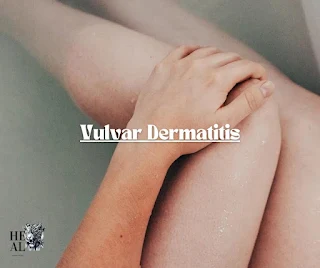Vulvar Dermatitis
Vulvar dermatitis is a skin condition that causes an itchy, irritated, and inflamed vulva. A flare-up can occur if you come into contact with a substance that irritates your skin or triggers an allergic reaction. Avoiding the allergen or irritant, practicing proper vulvar care, and taking corticosteroids prescribed by your provider can help manage the condition.
What is Vulvar Dermatitis?
Vulvar dermatitis is a common skin condition affecting the vulva, the skin folds surrounding the vagina, leading to irritation and itching. It encompasses conditions such as atopic dermatitis (vulvar eczema) and contact dermatitis, often resulting from skin damage or allergic reactions to environmental factors.
Who is Affected by Vulvar Dermatitis?
Vulvar dermatitis can impact anyone with a vulva. Those who haven’t reached puberty or have gone through menopause are at a higher risk due to lower estrogen levels, which make the vulvar skin more susceptible to dryness, thinness, and irritation.
Symptoms and Causes
What are the Symptoms of Vulvar Dermatitis?
The primary symptom of vulvar dermatitis is vulvar itching (vulvitis), which can range from mild to severe. Additional symptoms may include:
- Burning, stinging, or raw sensations
- Thicker skin patches
- Redness
- A wet feeling in the vulva
- Pain or discomfort during intercourse, tampon insertion, or pelvic exams
Symptoms may worsen at specific times, such as nighttime, during menstruation, or in hot or sweaty conditions.
What Causes Vulvar Dermatitis?
Vulvar dermatitis results from contact with irritants or allergens that damage the vulvar skin. Common culprits include:
- Soaps and shampoos
- Deodorants and perfumes
- Douches and talcum powder
- Synthetic underwear
- Laundry detergents
- Sanitary products
- Food preservatives
Individuals with urinary or fecal incontinence may be at higher risk due to skin exposure to urine and feces.
Diagnosis and Tests
How is Vulvar Dermatitis Diagnosed?
Diagnosing vulvar dermatitis requires ruling out other conditions with similar symptoms, such as:
- Lichen planus
- Lichen sclerosus
- Psoriasis
- Seborrheic dermatitis
- Vaginal atrophy
- Vaginitis
- Vulvar cancer
- Vulvitis
- Vulvodynia
- Yeast vulvitis
The diagnosis involves assessing your medical history, symptoms, a physical examination, vaginal discharge testing, patch testing for allergens, and, in some cases, a biopsy.
Management and Treatment
How is Vulvar Dermatitis Treated?
Effective management involves avoiding potential irritants and allergens while practicing proper vulvar care. Lifestyle changes can help alleviate symptoms, including:
- Using mild, unscented soap and warm water
- Wearing breathable cotton underwear
- Using gentle detergents
- Avoiding douching and scented feminine hygiene products
If symptoms persist, medications may be prescribed, such as anti-itch medications, corticosteroid ointments, and anti-itch emollients. Treating underlying conditions, like infections, is crucial for comprehensive care.
Prevention
How Can I Reduce My Risk?
While you can’t prevent vulvar dermatitis if you are genetically predisposed, you can reduce your risk by practicing proper vulvar care and avoiding irritants and allergens in your environment.
Outlook / Prognosis
What Can I Expect if I Have This Condition?
The duration of recovery varies depending on the cause. For instance, contact dermatitis may resolve within a few weeks to a month after removing the offending substance. In cases of accompanying infections, the recovery period may be longer.
Living With Vulvar Dermatitis
When Should I See My Healthcare Provider?
It is advisable to consult your healthcare provider before using over-the-counter treatments for vulvar itching, as various conditions require different treatments. A proper diagnosis will help avoid using treatments containing irritants that need to be avoided.
Additional Common Questions
What Does Vulvar Inflammation Look Like?
Vulvar inflammation may manifest as swollen, red, or darker patches of skin in the labia, with areas of thicker skin compared to the surrounding skin.
What Does Vulvar Eczema Look Like?
Vulvar eczema may cause the vulva to appear swollen, red, or darker, similar to vulvar inflammation. It may also present with bumpy or scaly white patches of irritated skin.
Which Cream is Best for Itching in Private Parts?
The choice of cream depends on the cause of itching. Consult your healthcare provider to determine the appropriate medication for your specific symptoms.

